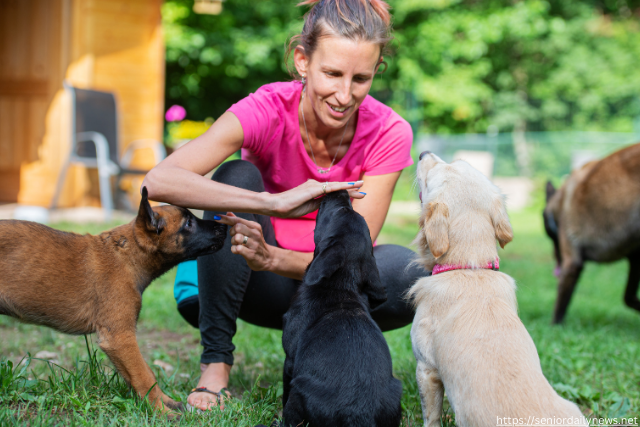
Training a Puppy vs. Training an Adult Dog: What’s Different?
Bringing a new dog into your home—whether a playful puppy or a full-grown rescue—is an exciting experience. However, training is a crucial part of raising a well-behaved and happy canine companion. While both puppies and adult dogs can be trained, their learning processes and challenges differ significantly.
Understanding these differences can help you set realistic expectations, develop effective training strategies, and build a strong bond with your furry friend. Let’s break down the key differences between training a puppy and training an adult dog.
1. Learning Capacity and Attention Span
Puppies: Quick Learners with Short Attention Spans
Puppies are like sponges, absorbing everything in their environment. Their brains are highly adaptable, making early socialization and training easier in many ways. However, their attention spans are short, and they get easily distracted.
Training Tips for Puppies:
- Keep sessions short and fun (5-10 minutes at a time).
- Use high-value treats and enthusiastic praise.
- Be patient—puppies are still figuring out the world!
Adult Dogs: More Focused but with Set Habits
Adult dogs may take longer to unlearn bad habits or adjust to new ones, especially if they have had little or no previous training. However, they generally have better focus and self-control, which can make structured training sessions more effective.
Training Tips for Adult Dogs:
- Use positive reinforcement to build trust.
- Be consistent and reinforce commands daily.
- If retraining an older dog with bad habits, use gradual desensitization techniques to break old behaviors.
2. Housebreaking and Potty Training
Puppies: Learning from Scratch
Puppies have tiny bladders and little control over their bodily functions. They need frequent potty breaks and a consistent schedule to learn where and when to go.
Potty Training Tips for Puppies:
- Take them outside every 2-3 hours, after meals, play, and naps.
- Reward immediately after they potty in the right place.
- Be patient—accidents will happen!
Adult Dogs: Easier, But Habits Matter
Most adult dogs, especially if they’ve lived in a home before, already have some house training. However, rescued or neglected dogs may need to be re-taught where to go.
Potty Training Tips for Adult Dogs:
- Follow a strict routine to establish new habits.
- Use positive reinforcement rather than punishment.
- If accidents happen, rule out medical issues first.
3. Socialization Needs
Puppies: Critical Socialization Window
The first 8-16 weeks of a puppy’s life are crucial for socialization. Exposing them to different people, places, and experiences early on helps prevent fear and aggression later.
Socialization Tips for Puppies:
- Introduce them to friendly dogs, new sounds, and different environments.
- Keep experiences positive and rewarding.
- Avoid overwhelming them—go at their pace.
Adult Dogs: Overcoming Past Experiences
Adult dogs may come with past experiences—good or bad—that shape their behavior. Some may be fearful or reactive due to lack of socialization in their early years.
Socialization Tips for Adult Dogs:
- Use controlled, gradual exposure to new experiences.
- Build confidence with reward-based training.
- Work with a professional trainer if your dog shows severe fear or aggression.
4. Teaching Basic Commands
Puppies: Learning from Scratch
Puppies don’t know basic commands yet, so training requires patience and repetition. They respond well to lure-based training with treats.
Best Commands to Teach First:
- Sit (the foundation for many other commands)
- Come (for safety and recall)
- Stay (for impulse control)
- Leave it (to prevent unwanted chewing)
Adult Dogs: Can Learn New Tricks!
Despite the saying, adult dogs can learn new tricks! In fact, they may even pick up commands faster because they have better focus.
Tips for Teaching Commands to Adult Dogs:
- Use clear, consistent cues.
- Reward good behavior immediately.
- Be patient—older dogs may need more time to adjust to new routines.
5. Behavioral Challenges
Puppies: Biting, Chewing, and Zoomies
Puppies explore the world with their mouths, leading to teething-related nipping and chewing. They also have bursts of energy (zoomies) and may struggle with impulse control.
How to Handle Puppy Behavior:
- Provide teething toys instead of letting them chew furniture.
- Teach bite inhibition using redirection and “yelp” techniques.
- Schedule plenty of play and exercise to burn off energy.
Adult Dogs: Past Trauma and Bad Habits
Rescued or rehomed adult dogs may have fear-based behaviors, anxiety, or aggression from past experiences. Some may have learned bad habits like jumping, leash pulling, or excessive barking.
How to Correct Adult Dog Behavior:
- Identify the root cause (fear, boredom, lack of training).
- Use behavior modification techniques (e.g., desensitization).
- Work with a professional trainer for severe issues.
Which Is Easier to Train: Puppies or Adult Dogs?
There’s no one-size-fits-all answer. Puppies require more time, patience, and supervision, while adult dogs may need to unlearn bad habits but often focus better.
Who Should Get a Puppy?
✔️ If you have time and patience to raise and train from scratch
✔️ If you want to shape behavior early on
✔️ If you’re prepared for the challenges of potty training and puppy energy
Who Should Get an Adult Dog?
✔️ If you prefer a dog with established personality traits
✔️ If you’re okay with working on past behaviors
✔️ If you want a more settled, less hyperactive companion
